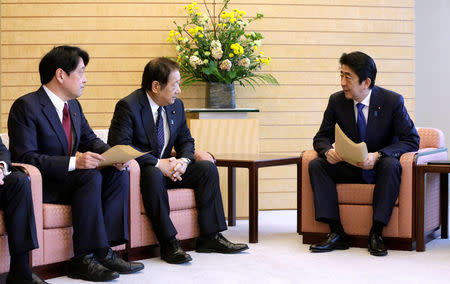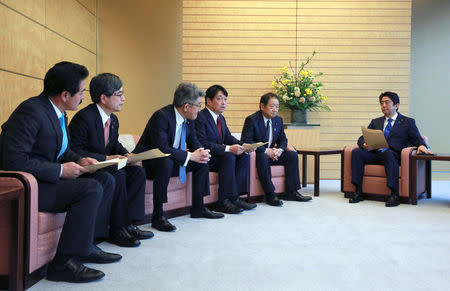Japan ruling party urges govt to acquire capability to hit enemy bases
TOKYO (Reuters) - Japan's ruling party on Thursday urged Prime Minister Shinzo Abe's government to consider acquiring the capability to hit enemy bases and to beef up missile defence, as North Korea defies U.N. sanctions with its nuclear and missile development. "North Korea's provocations have reached a level where our country can by no means overlook them ... We cannot afford to lose any time to bolster our ballistic missile defence," said a Liberal Democratic Party (LDP) proposal submitted to Abe. Japan has so far avoided taking the controversial and costly step of acquiring bombers or weapons such as cruise missiles with enough range to strike other countries, relying instead on its U.S. ally to take the fight to its enemies. But the growing threat posed by Pyongyang, including a simultaneous launch of four rockets earlier this month, is adding weight to an argument that aiming for the archer rather than his arrows is a more effective defence. "Our assessment is that threat from North Korea has advanced to a new stage, and this assessment is shared by the United States," Abe said at a ceremony where the proposal was submitted. "We intend to grasp today's proposal firmly." The LDP proposal demanded that the government promptly start necessary consideration for the acquisition of capability to hit enemy bases, such as cruise missiles, to improve deterrent effects of the U.S-Japan alliance. "The first (missile) attack can be met with our missile defence. But as for repetitive attacks, it is important to put under control the opponent's launch sites and prevent second and further firing," Itsunori Onodera, an LDP lawmaker and former defence minister, told the ceremony. "This is not a proposal about preemptive attacks, but about counter attacks to prevent the second (missile) launch." Acquiring weapons capable of reaching Japan's neighbours would likely anger China, which is strongly protesting the deployment of the advanced U.S. Terminal High Altitude Area Defence (THAAD) anti-missile system in South Korea. The LDP proposal also called on the government to swiftly start examining the possible introduction of such advanced missile defence systems as Aegis Ashore and THAAD, and to accelerate technological development for operating Japan's own early warning satellites. Aegis Ashore is a land-based version of the missile defence system used at sea, while early warning satellites are used to detect missile launches. Japan currently relies on the United States for such information. Washington-based 38 North, a website that monitors North Korea, said on Tuesday satellite imagery of North Korea's main nuclear test site taken over the weekend indicated that Pyongyang could be in the final stages of preparations for a sixth nuclear test. Successive governments have interpreted Japan's post-World War Two pacifist constitution as allowing a military for "self-defense" only. Under Abe's watch, Japan's parliament in 2015 voted into law a defence policy shift that could let troops fight overseas for the first time since 1945, a milestone in his push to loosen the constraints of the U.S.-drafted constitution. (Reporting by Kiyoshi Takenaka, Nobuhiro Kubo; Editing by Michael Perry)

 Yahoo News
Yahoo News 

